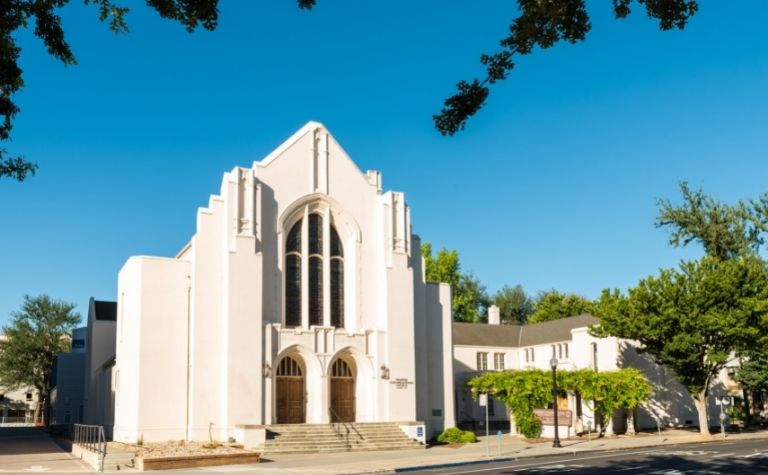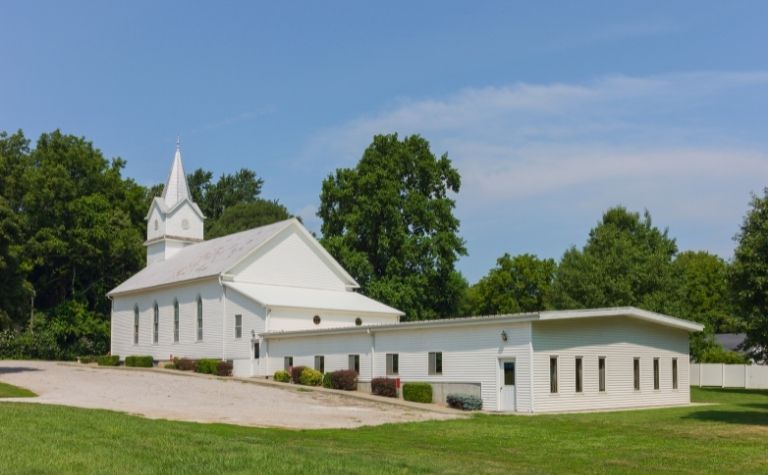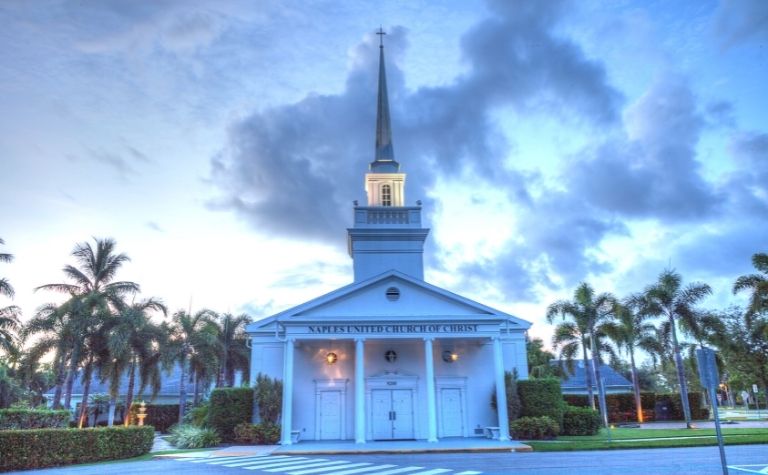There are many different denominations in the world today and it can sometimes be challenging to understand the beliefs and values of each one. The United Church of Christ sounds similar to other denominations, making it easy for people to confuse it with other organizations. Nevertheless, many people want to know more about its churches.
The United Church of Christ is a religious tradition, with roots that are historically Christian, that has been called the most liberal and progressive mainline Protestant denominations in the world today. The UCC has over 700,000 members. Former President Barak Obama is one of its most famous members.
When was the United Churches of Christ denomination founded? Is its membership growing or shrinking? When did it affirm LGBTQ rights? What happened afterward? What do the denomination’s belief statements say? Keep reading to learn the answers to these questions and others.
Also see Why Do People Leave the Church of Christ? to learn more.

United Church of Christ: Fast Facts
The United Church of Christ (UCC) identifies itself as: “The United Church of Christ is an inclusive and diverse community of Christians connected by faith that calls us to build a just world for all. Our ministries advocate at a national and global level, but our roots are planted firmly in our local churches in communities like yours.”
| Branch | Protestant (mainline) |
| Worldview | Liberal |
| Founded | 1957; a result of the Evangelical and Reformed Church and the Congregational Christian Churches merging |
| Theology | Historically, Reformed; presently, liberal-progressive |
| Headquarters | Cleveland, Ohio |
| Membership | Between 700,000 and 800,000 (and shrinking)* |
| Churches | Between 4,000 and 5,000 (and shrinking) |
*The denomination has suffered a 44 percent loss in membership since the mid-1960s.
| States | Most members are in Pennsylvania, Connecticut, Vermont, and Maine |
| Society | values access to abortion, women’s rights, LGBTQ rights** |
| Tolerance | describes itself as “an extremely pluralistic” denomination |
| Motto | “That they may all be one” (John 17:21) |
| Members | Well-known past and current members include Barak Obama, Hubert Humphrey, Walter Brueggemann, H. Richard Niebuhr, and Paul Tillich |
**In 2005, the UCC became the largest historically Christian denomination to affirm equal marriage rights for gay and lesbian couples. 80 percent of delegates to the church’s 2005 General Synod voted in favor of the motion. Presently, it is the second-largest historically Christian denomination to affirm equal marriage after the Presbyterian Church (USA).
After the resolution to affirm equal marriage passed, the UCC’s Puerto Rico Conference left the denomination, citing differences over the membership and ministry of gay, lesbian, bisexual, and transgender Christians.” A number of conservative churches also ended their affiliation with the denomination after the decision in favor of same-sex marriage.
Also see What Are the Largest Christian Denominations? to learn more.

What does the United Church of Christ believe?
The theological history of the UCC is often described with four terms: “Christian,” “Reformed,” “Congregational” and “Evangelical.” While members still use these terms, the traditional definitions of them are no longer embraced in the denomination.
For example, the present UCC doesn’t embrace the same views and positions as other conservative “evangelical” churches do on most theological and social matters.
The UCC values liberal and progressive positions on theological and social issues. The denomination only loosely embraces historic orthodox Christian doctrine as it retains some of the language and customs.
The UCC has two belief statements, which are similar, but not identical. The first was adopted by the General Synod in 1959.
Original Version of the UCC belief statements
We believe in God, the Eternal Spirit, Father of our Lord Jesus Christ and our Father, and to his deeds we testify:
- He calls the worlds into being, creates man in his own image and sets before him the ways of life and death.
- He seeks in holy love to save all people from aimlessness and sin.
- He judges men and nations by his righteous will declared through prophets and apostles.
- In Jesus Christ, the man of Nazareth, our crucified and risen Lord, he has come to us and shared our common lot, conquering sin and death and reconciling the world to himself.
- He bestows upon us his Holy Spirit, creating and renewing the church of Jesus Christ, binding in covenant faithful people of all ages, tongues, and races.
- He calls us into his church to accept the cost and joy of discipleship, to be his servants in the service of men, to proclaim the gospel to all the world and resist the powers of evil, to share in Christ’s baptism and eat at his table, to join him in his passion and victory.
- He promises to all who trust him forgiveness of sins and fullness of grace, courage in the struggle for justice and peace, his presence in trial and rejoicing, and eternal life in his kingdom which has no end.
Also see Christianity and Mormonism: Compared to learn more.

Updated Version (Robert V. Moss Edition)
We believe in God, the Eternal Spirit, who is made known to us in Jesus our brother, and to whose deeds we testify:
- God calls the worlds into being, creates humankind in the divine image, and sets before us the ways of life and death.
- God seeks in holy love to save all people from aimlessness and sin.
- God judges all humanity and all nations by that will of righteousness declared through prophets and apostles.
- In Jesus Christ, the man of Nazareth, our crucified and risen Lord, God has come to us and shared our common lot, conquering sin and death and reconciling the whole creation to its Creator.
- God bestows upon us the Holy Spirit, creating and renewing the church of Jesus Christ, binding in covenant faithful people of all ages, tongues, and races.
- God calls us into the church to accept the cost and joy of discipleship, to be servants in the service of the whole human family, to proclaim the gospel to all the world and resist the powers of evil, to share in Christ’s baptism and eat at his table, to join him in his passion and victory.
- God promises to all who trust in the gospel forgiveness of sins and fullness of grace, courage in the struggle for justice and peace, the presence of the Holy Spirit in trial and rejoicing, and eternal life in that kingdom which has no end.
Also see Catholic vs Protestant vs Orthodox Compared to learn more.
Related Articles
Roman Catholicism is one of the three historical branches of the Christian religion, Protestantism and Eastern Orthodoxy. On the other hand, pentecostalism is one of the fastest-growing movements in...
In the span of a century, the Assemblies of God has become one of the largest and most influential denominations in Protestant Christianity. Bethel Church is a Pentecostal megachurch in Redding,...
